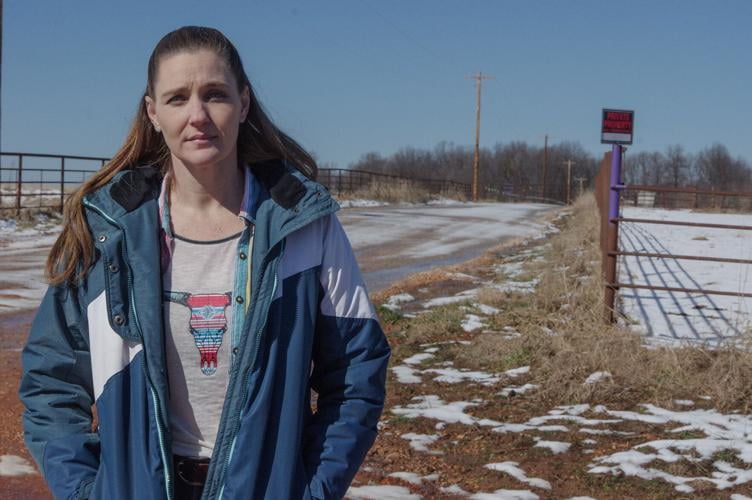FAIRVIEW, Mo. — As residents of Newton and McDonald counties prepare for another spring and summer outdoors, they’re hoping legislation to regulate odors will protect them.
Rural Fairview resident Vallerie Steele said her grassroots group, called Stop Land Use Damaging our Ground and Environment — or SLUDGE — has been working with state Sen. Jill Carter and state Rep. Dirk Deaton to push for more regulation of companies that store and spread waste, mostly from food processing plants, as fertilizer. Carter represents Jasper and Newton counties; Deaton represents parts of Newton and McDonald counties.
As of Wednesday, Deaton’s bill was combined with a bill introduced by Rep. Ed Lewis, from Randolph County, which passed out of committee and faced further debate in the Missouri House before possibly being approved and moved to the Senate.
Deaton said that debate could happen as soon as next week.
“We have filed a bill to really try to replicate what other states have and create a minimal regulatory framework,” Deaton told area residents and business leaders at a meeting Friday in Carthage. “It’s got to be permitted through the DNR. There’s a right and wrong way to do things: setbacks, application rates — you’ve got to apply it at a specific rate, you can’t overapply it more than what the ground can take — testing as needed and necessary, just really good practices and commonsense initiatives.”
In a statement Wednesday, Denali Water Solutions said it is “actively working with legislators to propose revisions” to Lewis and Deaton’s legislation.
“While Denali supports revised regulations focused on transparency, we feel strongly the current draft bill requires significant revisions,” the company said. “We’ve operated responsibly and per Missouri regulations for decades and are hopeful that we can work with legislators to arrive at a reasonable solution. As written, the current bill would add excessive regulation and would have negative impacts on the state’s economy and businesses. Denali is committed to working toward common-sense regulations that support Missouri’s food manufacturers, farmers and the strength of Missouri’s economy in a responsible manner.”
Complained for years
For years, residents of Newton and McDonald counties have complained about foul odors coming from wastewater lagoons located in rural parts of both counties and the overspreading of the product from these lagoons on farmland. Residents refer to the product as “sludge,” but one of the companies spreading it argues it has value as a fertilizer. Residents have complained about odors that were so thick they clung to clothing, have prevented them from enjoying being outdoors, affected businesses and more.
In some cases, it has flowed into streams that feed into the Elk River, which provides drinking water and recreation for thousands of people in Southwest Missouri and flows into Oklahoma’s Grand Lake. Resident also have been worried about the impact the odors have on property values and lifestyle, as well as concerns for their health.
Deaton said that until July, the spreading of the waste product by Denali and other companies went unregulated because the Missouri Fertilizer Board had labeled the material as fertilizer, exempting it from needing wastewater or solid waste permits.
• On June 30, 2023, the Fertilizer Board decided not to exempt these operations any longer, making them subject to Missouri Department of Natural Resources regulation, but the DNR initially said it would not take any action to stop the practices.
• On Nov. 29, 2023, the DNR announced it was reversing that decision “based on its land application noncompliance.”
The department noted six past violations of the Missouri Clean Water Law at Cave Springs Branch in McDonald County and Indian Creek in Newton County “resulting in discharge to waters of the state without a permit, causing pollution and violating water quality standards.”
And on Oct. 3, DNR staff conducted an investigation in response to public concern and observed evidence of overapplication of materials on saturated ground. “Based on observations made during the investigation, the department issued a notice of violation for operating without a permit and placing water contaminants in a location where they are reasonably certain to cause pollution,” DNR said.
Denali was ordered to stop all land application of the waste anywhere in Missouri.
Denali Water Solutions has said through spokesman Samuel Liebl: “More than 100 Missouri farmers rely on our organic fertilizers, and dozens of Missouri food manufacturers employing more than 10,000 Missouri workers depend on our services to continue their current business operations. Without the ability for Denali to operate, these Missouri companies will face extremely challenging and costly decisions. We believe this abrupt action by the Missouri DNR puts the state’s food industry at risk.”
Denali, based in Russellville, Arkansas, also defended its operations in Missouri in an earlier statement.
“Denali has a long track record of responsibly handling the residuals that result from water treatment at food manufacturing facilities, recycling these residuals as valuable fertilizers, and protecting clean water in Missouri,” the company said. “We are committed to ensuring a positive outcome for Missouri farmers, businesses and communities and are working with all parties involved on a long-term solution as soon as possible.”
• On Jan. 31, 2024, Denali and the DNR reached an agreement that Denali would empty its lagoons in Newton County, McDonald County and Randolph County until they could be properly permitted through the DNR’s wastewater permitting process. In Southwest Missouri, one of the lagoons is near Fairview, the other near Stella.
In its statement Wednesday, Denali also said that following that decision, “Denali sought ways to keep the food processing residuals stored in Missouri basins in Missouri. However, because of the limitations of wastewater treatment plants in Missouri and because of DNR’s decisions, Denali is partnering with farmers in other states to put these food processing residuals to good use.”
Legislative action
In addition to the House bill sponsored by Deaton and Lewis, Carter said she introduced Senate Bill 1369, which contains identical language to the current version of the House bill and is working its way through the Senate, creating more than one chance that some kind of legislation will pass this year.
“I’m a farmer, we have a farm, and there’s nothing that I would ever do to try to impede farmers from being able to have the nitrogen content that they need for their farm,” Carter said Friday in Carthage. “We need to make sure that whatever it is that we’re spreading on our farmland isn’t something that is toxic. Out East, what has happened is the feds are coming in and saying, ‘OK, because (what) you sprayed is waste, this toxic waste, now you cannot use your land for agriculture purposes. And some of these farms are multigenerational farms. So we just want to make sure there’s definitely a balance and the future of farmland in Southwest Missouri is protected.”
Steele said she and others with SLUDGE are working to try to improve whichever bill might come out of the process.
She said her group pushed for a list of requirements they thought were needed to deal with the issue, but some lawmakers and lobbyists with agricultural interests pushed back.
Steele said she told Carter they wanted more testing of the material in the basins and being spread on the land and proper chain of custody for test samples. The group also wanted sample results sent straight to the state and not to the waste companies first.
The bill also includes setbacks that would require lagoons that hold 14 million gallons of wastewater to be placed at least 4,000 feet from any occupied buildings, such as homes, businesses and schools, and enable the DNR to create setbacks on the land application of waste sludge.
SLUDGE will meet next at 5 p.m. Saturday, Feb. 24, at the East Newton High School gymnasium. The meeting will begin with a silent auction and raffle, and the presentation part of the program begins at 6 p.m.






















Commented
Sorry, there are no recent results for popular commented articles.